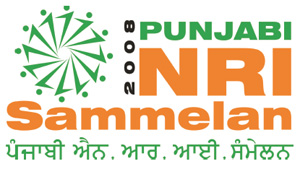
Punjab NRI Conference
Economic development and investment opportunities in Punjab were discussed at the Punjab NRI Sammelan, in Chandigarh and Jalandar, on January 5th and 6th. This brings about an important topic of maintaining our heritage and the significance of NRIs giving back to their communities in Punjab. There was a time when NRIs were investing their money made overseas by going back to their village and building a big haveli with a huge artificial plane sticking out of the roof (so they, and everyone else, could see their house when flying over their village!). Thankfully something positive, and more meaningful, is being asked of Punjabis overseas. We are all fully aware of the lack of employment opportunities, education and healthcare and how these issues have created dire consequences of drug-use and alcohol abuse. The conference was attended by prominent NRI’s including Dr. Ruby Dhalla, M.P. from Canada; Ms. Neena Gill, Member of EV Parliament in Brussels; and Mr. Varinder Sharma, former Major of London and Member of Parliament UK. The purpose of the conference was to present initiatives Punjab Chief Minister Badal, and his committee have created as improvements needed to increase the efficiency of Punjab’s infrastructure.  The goal of this conference is to attract technical and financial investments from NRIs. The attendees were given the opportunity to voice their opinions of what they felt should be noted as additional initiatives concerning the NRIs continuing financial support in future projects. One such request has been validated with the creation of an eleven member Advisory Committee to preside over issues related to the welfare of NRIs investments.
The goal of this conference is to attract technical and financial investments from NRIs. The attendees were given the opportunity to voice their opinions of what they felt should be noted as additional initiatives concerning the NRIs continuing financial support in future projects. One such request has been validated with the creation of an eleven member Advisory Committee to preside over issues related to the welfare of NRIs investments.
During the conference a British NRI pledged Rs. 5 million for the renovation and upkeep of a state-run school in his village, which was met by an equal pledge from the Chief Minister. Hopefully this action will encourage other individuals to follow suit, especially considering Sikhi teaches us values to help others less fortunate than ourselves and strive to create equality amongst people. Education is a key element in creating a sense of pride back into our Punjab, and a little can go a long way. I applaud this conference and hope we will hear and see more positive consequences from it. There is the likelihood of some negativity, such as the incident of Deepak Obhrai, the highest-ranking Indo-Canadian in the present government, being ignored by the Punjabi government. He feels he was excluded due to being “Hindu Punjabi” and not “Sikh Punjabi”. This does not bode well for us, especially when the purpose of this conference is to gain support from ALL Punjabis, and that we should be striving for equality. Differences need to be put aside for the selfless purpose of improving Punjab and allowing the people of Punjab to reach their true potential. Hopefully that purpose will be achieved successfully, and we can finally make a difference.














What is the place for Punjabi Muslims? Although I do not know Deepak Obhrai's roots, the Punjabi identity is expansive, while the goal of the conference seems rather specific — the tiny northwestern state of Punjab (not Haryana, Delhi, Himaschal Pradesh, or even W. Punjab).
What is the place for Punjabi Muslims? Although I do not know Deepak Obhrai’s roots, the Punjabi identity is expansive, while the goal of the conference seems rather specific — the tiny northwestern state of Punjab (not Haryana, Delhi, Himaschal Pradesh, or even W. Punjab).
[…] saw this post on Sepia Mutiny on Ruby Dhalla’s recent trip to Punjab. As previously blogged by Anandica, Dhalla, the Canadian MP of the Brampton, was there to attend the Punjabi NRI Sammelan. It seems […]
Teachers should consider the level of understanding of students. They should clarify themselves either student are able to understand or facing any difficulty. They should change the teaching methodology if students cannot understand them.